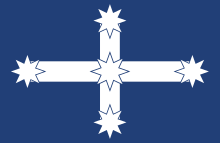Eureka Stockade
A Eureka Stockade ou Rebelião Eureka ocorreu em 1854, instigada por garimpeiros de Ballarat, Vitória, na Austrália, que se revoltaram contra a autoridade colonial do Reino Unido. Ele culminou na Batalha da Paliçada de Eureka, travada entre rebeldes e as forças coloniais da Austrália em 3 de dezembro de 1854 em Eureka Lead e batizada em homenagem a uma estrutura de paliçada construída por mineiros na preparação para o conflito.[1] A rebelião resultou em pelo menos 27 mortes e muitos feridos, a maioria das vítimas sendo rebeldes.

A rebelião foi o culminar de um período de desobediência civil durante a corrida do ouro vitoriana com os mineiros se opondo às despesas de uma licença de mineiro, tributação por meio da licença sem representação e as ações do governo, da polícia e militares.[2][3] A rebelião local cresceu a partir de um movimento da Ballarat Reform League e culminou na construção de uma rude ameia pelos rebeldes e em um cerco rápido e mortal pelas forças coloniais.
Quando os rebeldes capturados enfrentaram julgamento em Melbourne, o apoio público em massa levou à sua libertação e resultou na introdução da Lei Eleitoral de 1856, que determinava o sufrágio para os colonos do sexo masculino na câmara baixa do parlamento vitoriano. Este é considerado o segundo ato instituído de democracia política na Austrália.[2] A rebelião Eureka é identificada de forma controversa com o nascimento da democracia na Austrália e interpretada por muitos como uma revolta política.[4][5][6] Um museu dedicado em Ballarat, o Museu da Democracia Australiana em Eureka, abriga uma bandeira que os mineiros projetaram e juraram lealdade antes da batalha. Conhecida na época como a "bandeira australiana", tornou-se um símbolo nacional e às vezes é candidata a debates sobre a mudança da bandeira australiana.
| Beligerantes |  |
 | |
|---|---|---|---|
Colônia de Vitória
|
Rebeldes Stockade | ||
| Força | |||
| 276 | 190 | ||
| Vítimas e perdas | |||
| 6 mortos |
| ||
Referências
editar- ↑ Wendy Lewis, Simon Balderstone and John Bowan (2006). Events That Shaped Australia. New Holand. ISBN 978-1-74110-492-9.
- ↑ a b "The government was forced to abandon the licence substitute it with a cheaper miner's right which also conferred on men the right to vote" The Victorians: Arriving; Richard Broome, 1984. P.92.
- ↑ Withers, WB History of Ballarat and some Ballarat Reminiscences, Facsimile Edition Published by Ballarat Heritage Services 1999, First Published 1800, pp. 63–64.
- ↑ 'Dr. H.V. Evatt, leader of the ALP, wrote that "The Eureka Stockade was of crucial importance in the making of Australian democracy"; Robert Menzies, later Liberal Prime Minister, said that "the Eureka revolution was an earnest attempt at democratic government"; Ben Chifley, former ALP Prime Minister, wrote that "Eureka was more than an incident or passing phase. It was greater in significance than the short-lived revolt against tyrannical authority would suggest. The permanency of Eureka in its impact on our development was that it was the first real affirmation of our determination to be masters of our own political destiny." (from , quoting Historical Studies: Eureka Supplement, Melbourne University Press, Carlton, Vic., 1965, pages 125–6)
- ↑ Sunterass, Anne Beggs (2003). "Contested Memories of Eureka: Museum Interpretations of the Eureka Stockade". Labour History. History Cooperative. Archived from the original on 26 April 2007. Retrieved 22 December 2006.
- ↑ Geoffrey Blainey commented in 1963 that "Eureka became a legend, a battlecry for nationalists. republicans, liberals, radicals, or communists, each creed finding in the rebellion the lessons they liked to see." ..."In fact the new colonies' political constitutions were not affected by Eureka, but the first Parliament that met under Victoria's new constitution was alert to the democratic spirit of the goldfields, and passed laws enabling each adult man in Victoria to vote at elections, to vote by secret ballot, to stand for the Legislative Assembly."
- ↑ Wright, Clare (2013), The Forgotten Rebels of Eureka Text Publishing, Melbourne ISBN 9781922147370, pp. 428